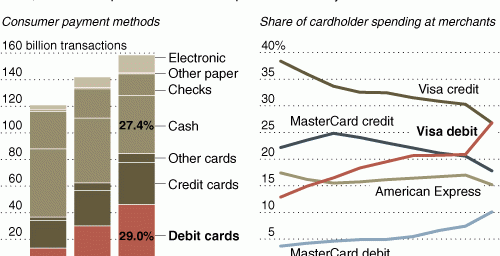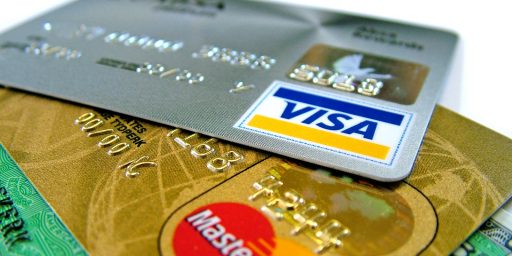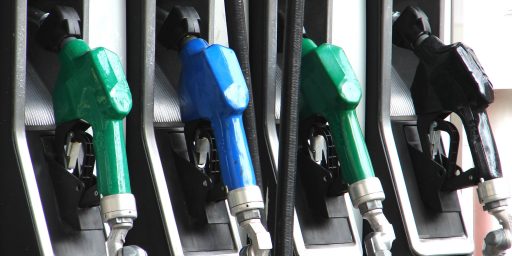Using Credit Cards to Buy Gasoline
The Oil Drum points out that many people are paying for gasoline with their credit cards.
Convenience stores, which sell about three-quarters of all gasoline sold in the nation, have seen the use of credit cards for motor fuel purchases rise to 70 percent of all gasoline purchases from about 54 percent last year, according to the industry group.
The article rightly notes that gasoline that costs $2.60/gallon can easily morph into $3/gallon if the balance is not paid off right away due to interest, finance charges, etc. So unless you expect to see some significant drops in the price of oil in the near future this might not be the best strategy for dealing with the higher gasoline prices.
Update: So far virtually all of the comments have been of the nature:
Well, I use a check card that works like a credit card, so this study is bogus.
This just doesn’t wash. Check cards are not something new. I’ve been using one for quite a while now. So this sudden surge in the use of cards (check, debit, or credit) is most likely due to something else. What has changed recently? Prices have gone up. So we have two hypotheses:
- People are using their cards more just because.
- People are trying to defer the increased cost of gasoline.
I think the second hypothesis is the more likely right now. Merely noting the existence of check and debit cards does nothing to weaken the second hypothesis because conditioning on this information applies to both hypotheses. In other words, the debit/check cards have been around before and during price increases and will likely be around afterwards. Hence, why should people increase usage simply because of the price increase? Because it is faster to pay at the pump with a check card? This was true prior to the price increase, hence is at best a very weak explanation. People are carrying less cash all of a sudden? Okay, but either it is a pretty interesting coincidence or it is not an explanation. I wouldn’t bet on this one. Gasoline prices have gone up and people’s budgets are being strained? Now that looks more reasonable. So, could this increase mean that there is no deferring of increased gasoline costs? Sure, but I think this is least likely possibility.






This article doesn’t say how many people are actually paying with credit cards because they want to defer the payment. I’ve always used the cards for the last 20 years because it’s more convenient to pay at the pump then having to go into to the station to pay, but I always pay my card balance off when the bill comes. This may be something, or may be nothing.
I haven’t paid for gas with cash on a regular basis for easily 14-15 years. I hate having to go into the gas station to pay.
Plus, I rarely carry much cash.
I paid with cash when I lived in SoCal, because the cheapest gas in the area in which I lived was at Arco, and they didn’t take credit cards at the time.
One also wonders what percentage of those cards are actually check cards/debit cards.
I use my AmEx to pay for gas because they give double rewards points for purchases at gas stations and the balance on that card gets paid in full each month. With higher prices, that just increases the benefit.
More broadly, as has already been noted, I don’t think the survey makes a distinction between people who are using credit cards because they want to defer payment as long as possible and those, such as myself, who use it primarily to manage cash flow and more easily keep track of what I’m spending money on.
I use my debit card every time I pay for gas. Is that separate from the credit cards? I don’t have to worry about cash and I don’t pay interest, best of both worlds.
I use my Mastercard to buy gas because I get 5% back in dividend cash (also I pay my balance off every month).
On the other hand, if you’re using credit cards to hoard gas to resell as the price goes up, hey, you might be investing wisely.
All my car expenses go on the credit card; gas, oil changes, and so on. I’m letting them keep my logbook.
Exactly, precisely, obviously.
You’d think anyone who has ever actually bought gasoline would know that.
I use my credit union check card. It looks like a credit card and when I buy gas or anything else for that matter, I tell the cashier that it is a credit card but the money comes out of my checking account. I bet that the statistics don’t differeniate between check cards and credit cards. This study is probably severely skewed.
I think the safe bet is that the propotion is between 0 and 1.
While the issue of paying at the pump with a credit card to save time and just because it is easier, and the use of debit/check cards are both valid points I don’t think suddenly out of the blue people increased the frequency of doing this for no reason. I bet the percentage of people deferring has gone up, not down or even stayed the same.
As such claims of “skew” are not quite accurate unless somebody can come up with a better explanation than: “Well I use my check card, not a credit card.”
We use debit cards for our gas purchases. I rarely use cash for it.
Ditto, here, to Leslie’s post. Also, perhaps more people have decided it’s wiser to use rebate cards now that prices have risen? A few cents in rebate may be, psychologically, more appealing @$2.98.
What’ll be curious to see is whether how much more money appears in the accounts of shops that still have a different price for credit cards vs. cash. We don’t have those anywhere near where I am in NJ (I’m not sure if it’s even legal), but I have seen them when traveling elsewhere.
It amazes me that today’s consumer doesn’t price shop. I’ve seen $0.15 -.18 difference between stations and don’t see any more buyers at the cheaper gas station. Years ago, most buyers would go across the street for a $.01 and a miracle would occur – the next day the price would drop. Gas wars were the rule because of we tightwads – I guess if you can afford a $50,000 SUV the $.15 is a mere pitance. Oh yeah! Theyused to check your oil and do your windshield to keep you as a customer -that’s where the label “service station” came from,I believe.
As someone else noted, there are lots of different credit cards out there that offer rewards. I travel a lot and over the past 2 years have begun to use a credit card that give me 5% back on gas purchases. I don’t use anything else. I pay off my balance every month and pocket $10-$25 rebates every month, depending on how much gas I use.
Think about it, at $3 per gallon, I get a $0.15 per gallon price break. Why would I use anything else? I’m sure that at least some of the people out there are doing the same thing.
I CANNOT believe no one has YET hit on the REAL reason for the uptick in the use of plastic over cash.
A LOT of stores that previously allowed people to pump gas first and pay after they finished pumping are now instituting “hard” pre-pay policies, which is a pain in the butt if you’re filling up the tank.
I use plastic just to avoid having to deal with that hassle, even if I have the money in my pocket. And I’ll bet a lot of others do so as well.
Uh, Steve, I assume you’ve heard of the 25-day grace period on new purchases (a feature of even the most craptacular credit card)? Time your purchase right and you get a 50-60 day interest-free loan.
That and I don’t think people these days are hauling around $30-50 in cash so they can plunk it down when they fill up.
People get points, rebates, discounts, etc. for using cards at gas stations. That might be part of it.
Sorry if this has already been said.
Maybe it is because credit cards are offering discounts for buying gas and groceries now.
If you can pay cash and get a price below $2.85/gallon then you are losing out. If the gas would cost you $2.85/gallon then you should be indifferent, and anything over $2.85/gallon you should use the card. Leslie on the other hand gets the 5% back and pays the balance off so that is like getting a 5% discount.
Okay, so you have 50 to 60 days, this doesn’t change the point of my post at all. Note the part where I write, “if the balance is not paid off right away due to interest, finance charges, etc.”? The point still stands that if you carry those balances forward past that date you end up paying more for the gasoline.
Again, I don’t see this undermines my point. I’ll restate it once again,
So if you payoff your balances and get a percentage bonus on purchases then it made sense to use the credit card before the price increase as well as after. This explanation is not likely going to explain the fairly big increase in credit card usage.
Unless this is a new policy it doesn’t offer much in the way of an explanation.
Yes, and if you don’t pay off that balance then you are going to be paying $3/gallon vs. $2.60 or whatever the price is where you buy gasoline. If you fill up a 20 gallon tank this is a differential of $8/tank of gas. You sure do put a very high premium on your time. It takes what maybe 5 minutes at most to pay cash, so this implies a $96/hour reservation wage.
Safety factor.
Who carries the $65 in cash needed to fill the tank?
I think Steve hits the nail on the head for the primary reason for the shift while Bithead pegs the secondary reason. All the other ideas given here are legit. However, I think they are probably down in the noise as far as impact on this study goes.
Steve,
Typically you try to be Mr. Empirical, which I applaud. As such, to be able to determine whether the shift in question measures what you think it measures you need more than two data points Further, you need to see what the general trends are in terms of credit card usage. Further, the prevalance of pay at the pump capability and other factors need to be established.
I don’t doubt that some of the shift is the result of increased gas prices–but also, gas prices were near two dollars last year, so it isn’t as if this is the first year of high gas prices–indeed, the most recent jump to 2.50ish is from the last month or so, which likley is a timeframe not captured by the study.
Hence, I think your update is a tad defensive.
Bryan S. makes a valid point that might actually account for some (although I will grant, not all) of the shift–with the increase in price I have noticed an increase in “pay first” signs in my part of the country, which means two trips inside (if you need change) if you pay with cash v. just one in the recent past (to pay). It is certainly an incentive to just go ahead and pay at the pump.
Has anyone taken into account the fact that those pay-at-the-pump machines are much more common now? I never bother with going inside any more, and I even usually carry plenty of cash.
Steven Taylor, above, is right. One pays for gas by credit card to avoid having to carry cash. I rarely have more than $20 in cash on me. I’ve spent two weeks overseas with only $10 in my pocket when I set out. The higher gas prices get the greater the inclination to use plastic to avoid carrying cash.
The haazards of not paying off your credit card bills are, of course, as you suggest.
And, of course, since I get frequent flyer miles for every $1 I charge and always pay on time I have an incentive to use the plastic and few disincentives.
I always used my credit card because I get a cashback, actualy for the past year I’ve been geting 5% back with my Citibank Divident card, and besides that I never carry cash, but I pay my card off every month
The comments above have eliminated straw man #1 (“just because”). So I guess we’re free to look for a more powerful explanation than #2 (“trying to defer the cost”). And once again, the commenters suggest more reasonable alternatives: ease of use, increased ability to pay at pumps, and rewards offered by card issuers. I know that to some extent these things existed last year as well, but I also know that people adopt things in stages (cutting edge, early adopters, mass adopters, and finally the old folks).
That’s true, but this strikes me as a big change in which to suggest it all due to ease of use and rewards benefits. Sorry, I’m still going with the defer explanation until I get some more information/data.